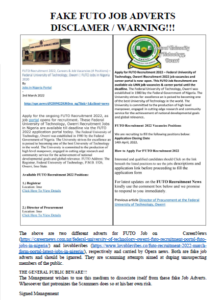| BTC 501 Process Biotechnology I 2,0,1 3 |
| BTC 503 Industrial Biotechnology 2,0,1 3 |
| BTC 505 Seminar in Biotechnology 0,1,0 1 |
| BTC 507 Research Project Biotechnology I 0,0,2 2 |
| BTC 509 Biotechnology Robotics and Analytical Methods in Biotechnology2,0,1 3 |
| BTC 511 Bioresource Management 2,1,0 3 |
| Elective 3 |
| Total 18 |
| Elective Courses |
| BTC 513 Plant Gene Transfer 2,0,1 3 |
| MCB 503 Immunology and Immunochemistry 2,0,1 3 |
|
|
|
| RAIN SEMESTER |
| BTC 502 Process Biotechnology I 2,0,1 3 |
| BTC 504 Genetic Engineering 2,0,1 3 |
| BTC 506 Nucleotide Sequence Analysis 2,0,1 3 |
| BTC 508 Research Project Biotechnology 0,0,4 4 |
| BTC 510 Bioethics, Biosafety and intellectual property Right 2,1,0 3 |
|
| Elective 3 |
| Total 19 |
| Elective Course: |
| BTC 512 Biology of Cancer 2,1,0 3 |
| BTC 518 Food Biotechnology 2,0,1 3 |
|
|
|
|
| HARMATTAN SEMESTER |
| Animal Biotechnology Option |
| COURSE NO: TITLE L. T. P UNITS |
| BTC 501 Process Biotechnology I 2,0,1 3 |
| BTC 505 Seminar in Biotechnology 0,1,0 1 |
| BTC 507 Research Project Biotechnology I 0,0,2 2 |
| BTC 511 Bioresource Management 2,1,0 3 |
| MCB 503 Immunology and Immunochemistry 2,0,1 3 |
| BTC 509 Biotechnology Robotics and Analytical Methods in Biotechnology 2,0,1 3 |
| Elective 3 |
| Total 18 |
| Elective Courses |
| BTC 503 Industrial Biotechnology 2,0,1 3 |
| BTC 515 Forensic Biotechnology 2,0,1 3 |
|
|
|
| RAIN SEMESTER |
| BTC 502 Process Biotechnology I 2,0,1 3 |
| BTC 504 Genetic Engineering 2,0,1 3 |
| BTC 506 Nucleotide Sequence Analysis 2,0,1 3 |
| BTC 508 Research Project Biotechnology 0,0,4 4 |
| BTC 510 Bioethics, Biosafety and Intellectual Property Right 2,0,1 3 |
| Elective 3 |
|
| Total
|
| Electives Courses |
| BTC 518 Food Biotechnology 2,0,1 3 |
| BTC 512 Biology of Cancer 2,1,0 3 |
|
|
|
|
| HARMATTAN SEMESTER |
| Plant Biotechnology Option |
| COURSE NO: TITLE L. T. P UNITS |
| BTC 501 Process Biotechnology I 2,0,1 3 |
| BTC 505 Seminar in Biotechnology 0,1,0 1 |
| BTC 507 Research Project Biotechnology I 0,0,2 2 |
| BTC 511 Bioresource Management 2,1,0 3 |
| BTC 513 Plant gene Transfer 2,0,1 3 |
| BTC 517 Plant Physiology 2,0,1 3 |
| Elective 3 |
| Total 18 |
| Elective courses |
| BTC 503 Industrial Biotechnology 2,0,1 3 |
| BTC 509 Biotechnology Robotics and Analytical Methods in Biotechnology2,0,1 3 |
|
| RAIN SEMESTER |
| BTC 502 Process Biotechnology I 2,0,1 3 |
| BTC 504 Genetic Engineering 2,0,1 3 |
| BTC 506 Nucleotide Sequence Analysis 2,0,1 3 |
| BTC 508 Research Project Biotechnology 0,0,4 4 |
| BTC 510 Bioethics, Biosafety and intellectual Property Right 2,0,1 3 |
| Elective 3 |
| Total 19 |
| Electives Courses |
| BTC 518 Food Biotechnology 2,0,1 3 |
| BTC 514 Seed Plants 2,1,0 3 |
|
|
|
|
| HARMATTAN SEMESTER |
| Microbial Biotechnology Option |
| COURSE NO: TITLE L. T. P UNITS |
| BTC 501 Process Biotechnology I 2,0,1 3 |
| BTC 503 Industrial Biotechnology 2,0,1 3 |
| BTC 505 Seminar in Biotechnology 0,1,0 1 |
| BTC 507 Research Project Biotechnology I 0,0,2 2 |
| BTC 509 Biotechnology Robotics and Analytical Methods in Biotechnology2,0,1 3 |
| BTC 511 Bioresource Management 2,1,0 3 |
| Elective 3 |
| Total 18 |
| Elective Courses |
| MCB 503 Immunology and Immunochemistry 2,0,1 3 |
| BTC 515 Forensic Biotechnology 2,0,1 3 |
|
| RAIN SEMESTER |
| BTC 502 Process Biotechnology I 2,0,1 3 |
| BTC 504 Genetic Engineering 2,0,1 3 |
| BTC 506 Nucleotide Sequence Analysis 2,0,1 3 |
| BTC 508 Research Project Biotechnology 0,0,4 4 |
| BTC 520 Microbial Genetics and Molecular Biology 2,0,1 3 |
| Elective 3 |
| Total 19 |
| Electives Courses |
| BTC 510 Bioethics, Biosafety and intellectual Property right 2,0,1 3 |
| BTC 518 Food Biotechnology 2,1,0 3 |
|
|
|
|
| HARMATTAN SEMESTER |
| Bioinformatics Option |
| COURSE NO: TITLE L. T. P UNITS |
| BTC 501 Process Biotechnology I 2,0,1 3 |
| BTC 505 Seminar in Biotechnology 0,1,0 1 |
| BTC 507 Research Project Biotechnology I 1,0,1 2 |
| BTC 509 Biotechnology Robotics and Analytical Methods in Biotechnology 2,0,1 3 |
| BTC 519/CSC 305 Data Structures and Algorithm Analysis 2,1,0 3 |
| BTC 521/CSC 403 Data management system and Design 2,1,0 3 |
| Elective 3 |
| Total 18 |
| Elective Courses |
| BTC 511 Bioresource Management 2,0,1 3 |
| BTC 515 forensic Biotechnology 2,0,1 3 |
|
| RAIN SEMESTER |
| BTC 502 Process Biotechnology I 2,0,1 3 |
| BTC 504 Genetic Engineering 2,0,1 3 |
| BTC 506 Nucleotide Sequence Analysis 2,0,1 3 |
| BTC 508 Research Project Biotechnology 0,0,4 4 |
| BTC 516 Probability and Random Variables 2,1,0 3 |
| Elective 3 |
| Total 19 |
| Electives Courses |
| BTC 518 Food Biotechnology 2,0,1 3 |
| BTC 520 Microbial Genetics and Molecular Biology 2,1,0 |


